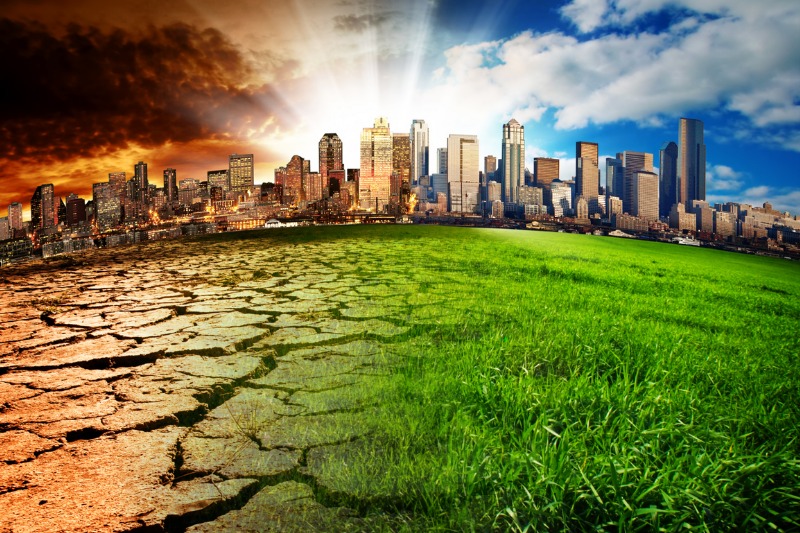U.S. Government Report Warns of Climate Change Impacts

The U.S. government released a new report on climate change that paints a sobering picture of the possible impacts to human health and the U.S. economy. According to CNN, the report predicts that the U.S. could lose as much as 10 percent of its GDP by the end of the century. Additionally, the report warns that thousands of Americans will die prematurely as a result of extreme temperature and weather events and increased exposure to insect-, food-, and waterborne diseases.
This report is the Fourth National Climate Assessment and was prepared by the U.S. Global Change Research Program, which is comprised of 13 federal agencies. The report explains that evidence of climate change is found in long-term trends, and looking at those trends, we are living in the warmest overall climate in modern history.
David Easterling, director of the Technical Support Unit at the NOAA National Centers for Environmental Information said, “The global average temperature is much higher and is rising more rapidly than anything modern civilization has experienced, and this warming trend can only be explained by human activities,” as reported by CNN. The world is already guaranteed to warm at least 1.1 degrees Fahrenheit, but without a drastic reduction in greenhouse emissions, we could see the Earth’s average temperature rise by as much as 9 degrees Fahrenheit above preindustrial levels by the end of the century, CNN reported.
The far-reaching effects of climate change have environmental costs that translate into economic and human health costs. The report states that in the U.S. alone, climate change impacts could cost our economy hundreds of billions of dollars each year. Some industries will be hit harder than others. According to CNN, higher temperatures, drought, and flooding will hit farmers especially hard. The report predicts that for corn and soybeans, two major crops in the Midwest, yields will drop by over 25 percent. Additionally, heat stress will cause a drop in dairy production, and the shellfish industry is expected to see a loss of $230 million by the end of the century due to ocean acidification and toxic algae blooms.
Also contributing to economic losses will be more severe wildfires and flooding. According to CNN, by 2050, up to six times more forest area could be lost annually to wildfires, which also often damage crops, property, and infrastructure and threaten human health and safety. In coastal areas, flooding is becoming a significant problem due to rising sea levels. Since 1900, the sea level has risen 7 to 8 inches, but importantly, almost half of that rise has occurred in just the last 25 years. As this rate of rise continues, up to $1 trillion worth of real estate is in danger, the loss of which would most certainly impact coastal tourism industries and other coastal economies.
Rising temperatures will also affect human health. CNN reported that the U.S. will see an increase in insect-, food-, and waterborne diseases, which tend to thrive in higher temperatures. For example, the report predicts more than twice as many cases of the mosquito-borne West Nile Virus in the U.S. by 2050.
Additionally, the heat itself will be deadly with more and more days each year reaching and surpassing 100 degrees Fahrenheit. The report predicts that the Midwest, where these days are currently rarer, will have the largest increase in extreme temperatures, resulting in 2,000 more premature deaths per year by 2090. The burden placed on energy systems during extreme weather will likely cause more power failures, compounding the health problems and causing additional economic losses. According to CNN, the very old, very young, poor communities, and communities of color will be at the greatest risk for illness and death due to climate change impacts.
Just as power failures during extreme heat compound the problems of extreme heat, the report gives other examples of the ways in which the effects of climate change compound the problems of climate change. CNN reported that by 2050, the Arctic sea ice will likely all melt by late summer each year, and that cycle could cause more permafrost to thaw. When permafrost thaws, the trapped organic carbon is released into the atmosphere as greenhouse gasses: carbon dioxide and methane, which then exacerbates warming, which causes further permafrost thaw, and so on. Cascading effects like these are concerning as they may be difficult to reverse once a tipping point is reached.
The purpose of this federal report is to inform policy-makers of the scientific evidence around climate change and draw conclusions about the likely effects on the United States. Although it does not offer specific solutions, the report is clear that by immediately reducing fossil fuel use and greenhouse emissions, thousands of lives and billions of dollars can be saved, according to CNN. However, the particulars of those steps are left to the policy-makers to determine, and many in the scientific community are calling on the U.S. government to take decisive action. The findings of this report are also aligned with those of the UN’s Intergovernmental Panel on Climate Change report released in October, which predicted similar global risks of extreme drought, floods, wildfires, and food shortages resulting from climate change.












